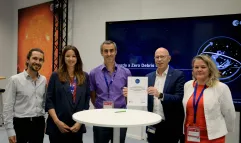On June 20, 2024, the first five Kinéis nanosatellites, part of the first European constellation dedicated to the Internet of Things (IoT), were successfully orbited by a Rocket Lab Electron launch vehicle from the Pacific coast of New Zealand’s North Island.
A total of five launches are planned to deploy this constellation of 25 nanosatellites. Each payload comprises two instruments: an Internet of Things (IoT) instrument and an Automatic Identification System (AIS) instrument, designed to identify ships in high-density traffic areas. The resulting IoT applications include near real-time tracking and monitoring of millions of objects, rapid alerts and transmission of data to end-users in areas of major importance for humans, human activity and the environment, such as natural disaster prevention (detection of forest fires, floods, drought, pollution...), agriculture, traceability of wild and farmed animals, infrastructure and energy network monitoring and oversight of transport and logistics, as well as commercial and scientific maritime activities. The potential applications are vast, with benefits including risk reduction, anticipation of breakdowns and optimization of activities.

Kinéis constellation © Thales Alenia Space - Kinéis - HEMERIA
The constellation is operated by Kinéis, a Toulouse-based company created in 2018 with the support of CLS (Collecte Localisation Satellites), the French Space Agency CNES and Bpifrance. At the heart of this constellation, Thales Alenia Space is system architect and responsible for building the payloads. Hardware development is subcontracted to Syrlinks. Hemeria is responsible for development of the platform (solar panels and harnesses manufactured in-house), integration and production engineering for the nanosatellites. CNES is providing the satellite command and control center and assisting with constellation operations as an integrated team until full handover to the Kinéis teams in 2025. CLS will deliver value-added services based on data from the constellation.
From ARGOS Neo to Kinéis
Each nanosatellite in the Kinéis constellation has an innovative IoT payload derived from ARGOS, and more recently ARGOS Neo, and developed under the responsibility of Thales Alenia Space, in collaboration with Syrlinks. Heralding a new generation of Internet of Things instruments, this payload sets a global standard in IoT and offers very high levels of data capture performance from extremely miniaturized beacons, including dedicated beacons for environmental protection.

ANGELS ©CNES
Thales Alenia Space and Syrlinks have achieved a real feat of technology by miniaturizing the payload components to make it compatible with the ANGELS (Argos Neo on Generic Economical and Light Satellite) mission platform, the first nanosatellite entirely developed and built by French industry for the Internet of Things. Launched in 2019, the ANGELS demonstrator served as the basis for the constellation, which will make Kinéis a singular player in tomorrow’s world of IoT.
Thales Alenia Space’s IoT expertise

Omnispace Spark-1 & Spark-2 © Thales Alenia Space
Building on its expertise on the ANGELS and Kinéis missions, Thales Alenia Space has been chosen by American startup Omnispace to build the first nanosatellites in its constellation dedicated to the Internet of Things: Spark-1 and Spark-2 launched in 2022.
Thales Alenia Space also developed the MEOLUT Next IoT-based search-and-rescue solution dedicated to the safety and security of people as part of the global Cospas/Sarsat system. Since it entered service in 2016, MEOLUT Next has delivered unrivalled performance, detecting distress signals at ranges of over 5,000 kilometers. It has been selected by the main Cospas/Sarsat users — the United States, Canada, France, the European Union, Togo, Thailand and Vietnam — and is helping save lives every year on land, at sea and in the air.

MEOLUT Next Antenna in Goose Bay, Canada ©Thales Alenia Space


